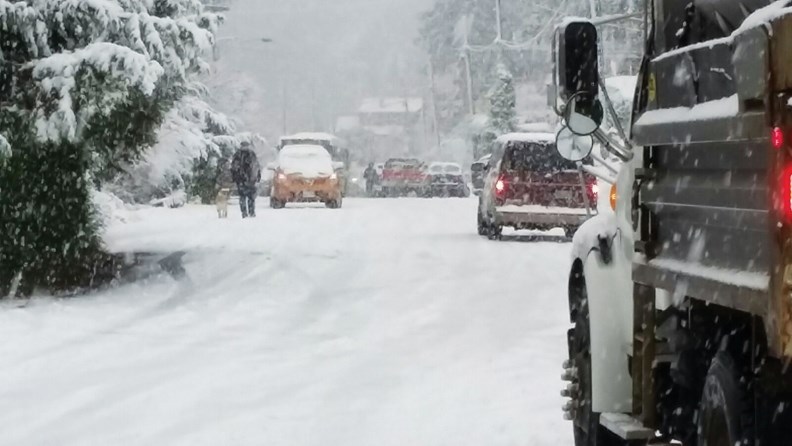Some people like it. Some moved here to escape it. And for others, it’s a true hardship.
The Sunshine Coast has been getting a taste of winter for the past week or so, but just how big a taste depends on where you are.
Environment Canada meteorologist Matt MacDonald said because temperatures were close to the freezing mark last weekend, the difference between rain and significant snowfall came down to “tenths of a degree.”
Areas along Howe Sound were hardest hit. The weather station at Port Mellon recorded 31 cm of snow on the ground by Saturday, but at the lower Coast’s other official weather station – the airport in Sechelt – there was only 1 cm. Environment Canada also gets data from a volunteer weather observer in the Gower Point area of Gibsons, who measured 6 cm. There’s no official measurement for the Pender Harbour area, but some spots would have gotten snowfall close to the 14 cm recorded in Powell River.
The snow forced Sunshine Coast Transit to reroute some buses, but School District No. 46 kept the schools open (although there were some early dismissals).
The cold weather emergency shelter at St. Hilda’s Church in Sechelt extended its hours from Dec. 9 to 11 to give people a place to go during the day.
They switched back to their usual 4 p.m. to 8 a.m. on Monday.
Coordinator Alicia Ladouceur said they saw roughly the same number of clients as they’ve been getting most nights since opening for the season. She also said the decision to extend the hours was prompted by the snow and cold, wet weather, and the shelter is assessing whether to do the same during the cold snap on a day-by-day basis.
Gibsons CAO Emanuel Machado said “compliance was limited” when it came to the Town bylaw requiring property owners to ensure the sidewalks in front of their homes or businesses are cleared. “Bylaw enforcement staff has been going door to door and reminding property owners, residential and commercial alike, of their obligations. The limited compliance and challenging weather has led to an accumulation of icy conditions on many sidewalks in Gibsons,” Machado said. “The lack of ice melting products in local stores didn’t help matters.”
Machado said Gibsons crews have already gone through 100 tonnes of salt. The Town used just three tonnes in all of 2015.
Sunshine Coast RCMP reported several minor accidents between Dec. 9 and 11. Two people were taken to hospital following a collision in Gibsons early Sunday morning, but their injuries were not serious.
“As the cold weather continues, it’s important that drivers make themselves aware of the road conditions and drive at speeds appropriate for those conditions,” said Const. Harrison Mohr. “While the roads may be fine at the location you are departing from, 15 minutes away the roads could be significantly worse.”
According to Environment Canada, a normal temperature range for mid-December is from lows around 3 C to highs of 7 C, so the dip to lows close to -10 C this week is significant.
MacDonald said it’s typical for this area to experience what meteorologists call “Arctic outbreaks” as early as November and what makes the recent weather pattern unusual is its staying power. The cold weather isn’t expected to move on until early next week.
“Monday [Dec. 19] seems to be the transition day, then we get back into the storm track from the Pacific,” he said. “That transition [is something] we’ll have to keep an eye on. It’s often that one that creates the potential for snowfall. It all has to do with how fast that moisture moves in and how deep that Arctic air is.”
One upside to the weather is the near-perfect conditions at the Dakota Ridge Winter Recreation Area. The Sunshine Coast Regional District-operated facility was due to officially open for the season on Dec. 16.



